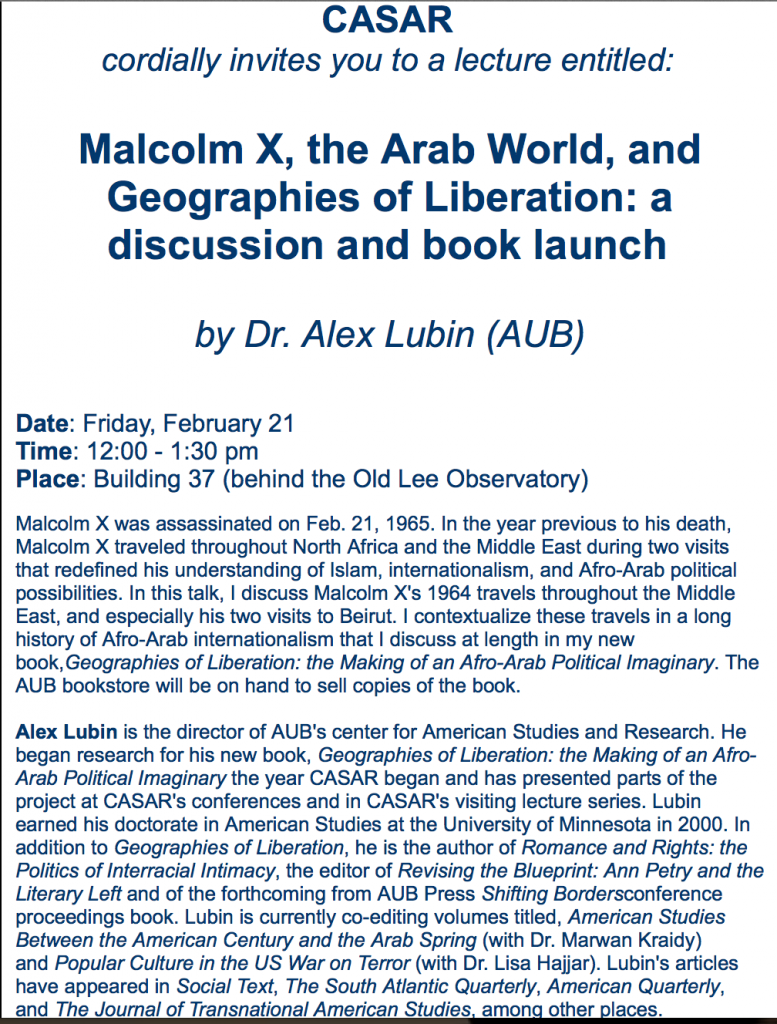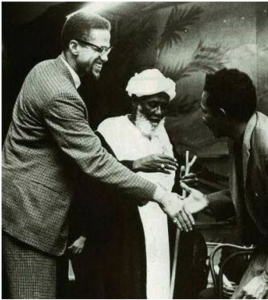You’re not supposed to be so blind with patriotism that you can’t face reality.
Wrong is wrong, no matter who says it.
— Malcolm X
Today, on the 49th anniversary of the assassination of Malcolm X, I attended a stimulating talk by my colleague Alex Lubin on Malcolm X’s travels in the Middle East–including Beirut. I’m thrilled to finally have my hands on a copy of his new book.
Since I’m currently teaching a class on Sudanese history and culture, I’ve been researching Malcolm X’s connections to the Sudanese community in Beirut, and to a Sudanese sheikh who accompanied him back home to the United States.
 In 1964, Malcolm X gave a talk in Beirut at the Sudanese Cultural Center, after the American University of Beirut deemed him too controversial to speak on campus. Because the crowd that gathered at the Sudanese Cultural Center was so large, loudspeakers had to be placed on the street to broadcast his stirring speech to those assembled outside.
In 1964, Malcolm X gave a talk in Beirut at the Sudanese Cultural Center, after the American University of Beirut deemed him too controversial to speak on campus. Because the crowd that gathered at the Sudanese Cultural Center was so large, loudspeakers had to be placed on the street to broadcast his stirring speech to those assembled outside.
In his autobiography, Malcolm X describes a walk through the streets of Beirut, when he arrived in Lebanon in April 1964:
…immediately my attention was struck by the mannerisms and attire of the Lebanese women. In the Holy Land [Saudi Arabia] there had been the very modest, very feminine Arabian women—and there was this sudden contrast of the half-French, half-Arab Lebanese women who projected in their dress and street manners more liberty, more boldness. I saw clearly the obvious European influence upon the Lebanese culture. It showed me how any country’s moral strength, or its moral weakness, is quickly measurable by the street attire and attitude of its women—especially its young women. Wherever the spiritual values have been submerged, if not destroyed, by an emphasis upon the material things, invariably, the women reflect it. Witness the women, both young and old, in America—where scarcely any moral values are left.
At the conclusion of his second trip to the Middle East (several months later), his views on women had changed–and he no longer judged women as an appropriate measure of a country’s morality:
…in every country you go to, usually the degree of progress can never be separated from the woman. If you’re in a country that’s progressive, the woman is progressive. If you’re in a country that reflects the consciousness toward the importance of education, it’s because the woman is aware of the importance of education.
But in every backward country you’ll find the women are backward, and in every country where education is not stressed it’s because the women don’t have education. So one of the things I became thoroughly convinced of in my recent travels is the importance of giving freedom to the women, giving her education, and giving her the incentive to get out there and put the same spirit and understanding in her children. And I am frankly proud of the contributions that our women have made in the struggle for freedom and I’m one person who’s for giving them all the leeway possible because they’ve made a greater contribution than many of us men.
This winter, when I was working in Sudan, I did some research on Sheikh Ahmed Hassoun–the Sudanese sheikh who served as a spiritual guide for Malcolm X, after he broke from the Nation of Islam and turned towards Sunni Islam. Sheikh Ahmed Hassoun accompanied him back to America in 1964, after Malcolm X had made his pilgrimage to Mecca. It was Sheikh Hassoun who ritually washed and prepared Malcolm X’s body for his funeral in Harlem.
In 2011, a long-forgotten recording of Malcolm X speaking at Brown University was discovered by a student (also named Malcolm) doing research in the library there. In the speech (parts of which you can hear below), Malcolm X talks about the place of Islam in global affairs–three years before coming to Beirut. His 1961 visit to the university was prompted by an article in the school newspaper criticizing the Nation of Islam–an article which had been written by Katherine Pierce, and edited by Richard Holbrooke.
Malcolm X’s legacy and image are still hotly debated and contested in America today–as illustrated earlier this month by the controversy over the cover of Nicki Minaj’s new album, and the labeling of Malcolm X as “violent” and “bad” by public school teachers in Queens–who forbade their students from writing a report on his life for Black History Month. Tonight in Beirut, on the 49th anniversary of his assassination, I’ll be watching with curiosity to see how his memory is contextualized and commemorated in the media back home…
I’m for truth, no matter who tells it. I’m for justice, no matter who it’s for or against.
— Malcolm X

